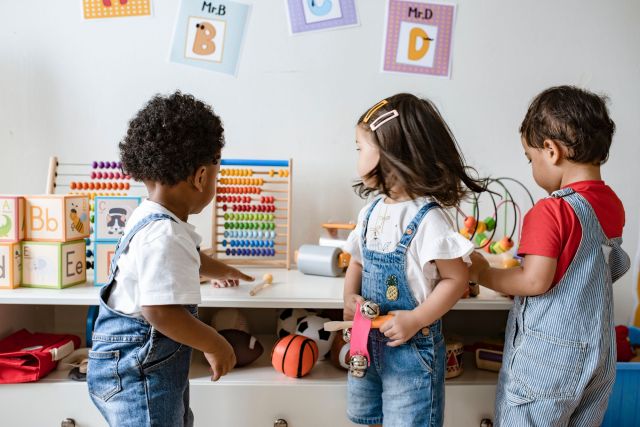Toddler parents, it’s time to prepare for the delicate dance that is sharing. One truck. Two kids. And only three seconds before you hear the dreaded shriek of impassioned possession: “Miiiine!” Ok, sure, you were prepared for this development. But what should seemingly be a passing “phase” seems to be taking forever. Your once loving child has become a toy-hoarding tot who plays takeaway and refuses to share anything within a 15-foot radius. When, if ever, will it end? And is all of this normal?!
Sharing Is Super Important
Sharing is an important life skill beginning in childhood and continuing into adulthood. It’s part of holding a conversation with another person, playing games with others and a way to be a good friend, says Eileen Kennedy-Moore, Ph.D., author of Growing Friendships: A Kids’ Guide to Making and Keeping Friends. “Sharing is a sign that we’re able to think beyond what I want to consider somebody else’s perspective and feelings,” she adds.
Whether it’s among siblings, classmates, neighbors or friends, sharing helps build connections and fuel relationships. And wrapped up in sharing are skills and insights, such as kindness, justice and patience.
But That Doesn’t Mean Sharing Is Easy
According to Dr. Kennedy-Moore, kids generally start looking around and thinking about what belongs to them at age two. And, as anyone who has seen the familiar scene unfold among preschoolers in a playroom, they almost all come to love the delicious power of declaring something, “Mine!” This impulse to call toys and other objects for themselves usually eases around age three or four, but children can still remain very attached to their stuff for years to come, Kennedy-Moore says.
What’s happening is that kids can view objects as an extension of themselves. Handing over their favorite doll to a friend can feel like a part of them is being taken away. “They’re worried that if they give something to someone else, they’ll never get it back,” Kennedy-Moore says. And as tough as sharing can be, it can be especially difficult for some kids. While certain children are naturally easygoing, others are more rigid and less tolerant of intrusions in their play.
Here’s What to Do If Your Toddler Won’t Share
Feel empathy.
Even mature adults can have a hard time sharing. Think about it. Would you hand over your expensive jewelry to your preschooler? Or split your sandwich with someone you just met? It’s important to empathize with the impulse to defend your stuff, say Joanna Faber and Julie King, co-authors of the best-selling How to Talk So Little Kids Will Listen: A Survival Guide to Life with Children Ages 2-7. Once you do this, you can better teach your child about sharing without it being coercive.
Praise sharing.
Adorably, littlest ones will share freely and openly. Think about your baby passing a gloppy handful of oatmeal across their high chair or a small ball for you to catch. Say “thank you” and praise them, Kennedy-Moore says. Point out how your child makes the recipient of their sharing feel. “Oh, you gave Jeffrey one of the dinosaurs to play with! Look how happy he is. Now two of you can play with dinosaurs.”
Talk frequently about fairness.
Introduce the idea of fairness to the sharing conversation when children are four or five years old. Kennedy-Moore notes that kids are acutely sensitive to what is fair, which can make it easier for them to handle sharing. Consider rituals, like one person cuts the brownie, and the other person picks their piece, to help encourage equality. And comment on what you observe: “I see two girls and four markers. What would be fair to everyone?” Also, try modeling lots of sharing and gratitude. “I have a cookie and I’m going to share it with Daddy.” Then Daddy says, “Thank you very much for sharing!”
Practice taking turns.
Asking a child to share may be a tall and somewhat vague request. How do you share a single toy? Taking turns is a much easier concept to grasp. My turn, your turn. Try giving the child who is waiting for their turn something else to do. Sing a song, play hand games, offer another toy or go get a snack. In Kennedy-Moore’s house, there was a highly sought-after (and fought-after!) bouncy horse. Her kids learned to count to 40 until it was time to swap spaces with the rider.
Put your child in charge.
Do some advanced planning before your next play date and allow your little one to be in the driver’s seat. Faber and King recommend having a conversation about what will be shared with visiting friends. “Becky and Sam are coming over today. They’ll be excited to play with your toys. What should we put out for them?” Then ask which toys your child wants to put away so they’re not out for the taking. This could be a favorite doll or stuffed animal, a brand new toy, something that can easily break or anything cherished or personalized, Faber and King say.
Don’t force it.
“We notice that kids who are forced to share their toys can be more possessive and less willing to share than kids whose property rights are clearly defended in the face of grabby siblings or friends,” Faber and King say. Simply put, don’t force your kid to share. It will get easier!
Even if your two- or three-year-old is a total toy hoarder, by the time it’s your child’s fourth birthday, they should have had plenty of sharing practice and a much better understanding of other people’s needs and feelings. They should care about friends and will know firsthand that sharing is a key way to make and keep pals.











